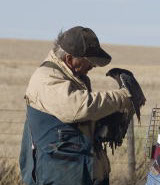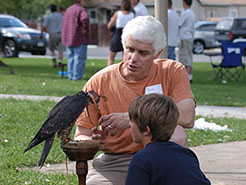
Colorado Hawking Club |
About Falconry

Falconry is an ancient, traditional cultural heritage using trained raptors to hunt wild quarry in its natural state. Its practice has been documented around the world since at least 3000 B.C.E. In recognition of this universal practice of humanity, UNESCO declared falconry to be an Intangible Cultural Heritage in 2010. It continues to be practiced by a highly-passionate and dedicated group of individuals around the world and here in the United States.
The Colorado Hawking Club provides a place where those who share in that passion can come together, exchange ideas, and work towards our common goals of land and species preservation, as well as the furtherance of regulations which are conducive to falconry. The primary purpose of this website is to aid in the communication and education of the general membership. You will also find pages that are intended for the general public containing basic information about the sport of falconry, contact information, and pointers if you are interested in becoming a falconer.
It is important to remember that many people who practice this intangible cultural heritage (some still call it a “sport”, but it’s so much more than that), live and breathe falconry twelve months out of the year. Unlike other hunting disciplines where you can clean the gun, and then lock it away in a safe for the remainder of the year, falconry requires year-round time and effort. You are essentially bringing another animal, more than just a pet, into your lives. This animal will require food and attention every day, regardless of weather, work, children, spouses, and the myriad of distractions that modern family live brings. If your bird becomes ill, you cannot simply take it to the dog and cat practice down the street; identifying and forming a good working relationship with a veterinarian who specializes in raptors is also very important for your bird’s health and well-being. Traveling or taking vacations is also not as easy as it is with other household pets.

You must have someone who is either knowledgeable enough to feed and care for your bird at your facility listed on your falconry license, or you must transport your bird to another appropriately-licensed falconer to care for your bird while you are absent. The state of Colorado must also be informed when such temporary care periods take place. All of these unusual factors must be taken into consideration when not only becoming a licensed falconer, but also when deciding to acquire a bird.
Copyright © 1966 - 2026 Colorado Hawking Club